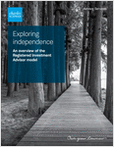What You Need to Know
- Wildfires, hurricanes and floods have hit many communities hard.
- Insurers hate natural disasters.
- Clients might be desperate to know if you have any ideas about what to do.
Homeowners insurance isn’t what it used to be, and it’s not currently something that life and annuity advisors can ignore.
The traditional model of homeowners insurance, which assesses risks based on historical data to determine price, has been disrupted by multiple factors.
For one, the escalating frequency and intensity of natural disasters, such as wildfires, hurricanes and floods, have caused unprecedented damage, forcing insurers to recalibrate their risk assessments.
Consequently, many insurance companies have begun to withdraw from high-risk areas or have significantly increased premiums, leaving homeowners in regions like California and Florida with fewer options for coverage.
Even outside the obvious high-risk areas, rising, high-cost claims have inflated insurers’ loss ratios, hurting profitability. This has forced many insurance providers to adopt stricter underwriting standards and increase premiums to maintain financial viability.
For your clients, this means that insuring their homes may now be difficult.
The Threats
Here are three factors to consider when talking to high-net-worth clients about this issue.
1. Erosion of Affordability
Wealth planners must anticipate the possibility that clients may struggle to secure coverage for their homes, potentially leading to an erosion of wealth if properties become uninsurable due to escalating risks.
Avoid letting a client respond by “going bare,” or doing without homeowners insurance.
2. Reduced Property Values
The perception of heightened risk in certain geographic areas can lower property values, reducing clients’ net worth.
Life and annuity-oriented wealth planners must consider strategies for mitigating this risk, such as using diversified investment portfolios or other arrangements to help clients offset potential declines in property value.
3. Inadequate Risk Preparedness
As homeowners insurance becomes harder to obtain, insureds may find themselves underinsured or lacking coverage for specific perils.
This increases the importance of proactive risk management strategies, such as using shutters or new types of roofing to increase high-value structures’ ability to get through natural disasters.
Ways Wealth Planners Can Help
As the challenges of securing homeowners insurance continue to intensify, wealth planners must act as strategic advisors, guiding their clients through uncharted territory.
Here are three ways to guide your high-net-worth clients.
1. Communicate early and clearly.
The process of securing insurance coverage should not be a reactive measure but a proactive one.












 Forrest Broyles is a broker with
Forrest Broyles is a broker with  Copyright © 2024 ALM Global, LLC. All Rights Reserved.
Copyright © 2024 ALM Global, LLC. All Rights Reserved.